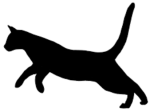From the book, Wide Awake at 3:00am, I learned that researchers had come up with an answer to a common question, “Why do we sleep”?
It’s a valid question. What’s the actual purpose of sleep? Why would nature favor having the majority of animal species waste several hours each day in a state of unconsciousness, getting nothing done, and becoming vulnerable to predators?
The answer the researchers came up with required turning the question on its head: “Why should any living thing bother waking up at all?” Perhaps sleep is the normal state of all life, and wakefulness is just some aberration – a phenomenon that evolved later – as a part-time activity to more efficiently pursue food and sex.
As a lover of naps and hater of alarm clocks, I kind of like this idea.
 I recall reading somewhere that sponges are “always asleep”. But I also read recently that sponges “never sleep”. Rather than go back and do more research to clear up this issue, I shall instead declare that the problem lies the definition of “sleep”.
I recall reading somewhere that sponges are “always asleep”. But I also read recently that sponges “never sleep”. Rather than go back and do more research to clear up this issue, I shall instead declare that the problem lies the definition of “sleep”.
If you’re a sponge, you have no neurons. Having no neurons is a good indication that you have no brain. And no brain means no dreaming. Sponges are not like us in that they are sessile: they have no motility (except in the larval stage, when genetic dispersal occurs). If you don’t have to get up and go to work, why bother having a brain? Brains provide inner-representations of the outside world – used to navigate unpredictable terrains. Sponges just sit there at the bottom of the ocean and collect ambient nutrition. A task so easy that anyone can do it in their sleep.
 Brains for Movement
Brains for Movement
The evolution of mobility required not only the direct control of muscles but also representations of reality that determined when and how those muscles get activated. Brains evolved in order for animals to evolve.
Long ago, there was no such thing as “waking up”. Until brains came along and gave organisms a reason to get off their asses and get a job. Perhaps asses and jobs had to evolve as well. But let’s not get too technical here.
It is possible that the binary states of wakefulness and sleep were not invented by brains themselves, but earlier in evolutionary history, by simple neuronal networks that generate sleep-like dynamics. Given that every location on Earth other than the poles has been cycling between day and night since before life emerged, it makes sense that organic periods would emerge to harmonize with this cycle.
Perhaps the very process of storing representations of reality – no matter how small or simple – requires a periodic cycle – as indicated by research finding that sleep is required for brains to prune useless memories and absorb useful ones.
My takeaway from all of this is that I have an organ that likes to make me do complicated things for many hours each day: sixteen to be exact. That’s a long time each day being on the move and getting worked up about other brains that are wreaking havoc on the world, such as the shriveled-up shitball inside of Donald Trump’s skull.
Before I die, I will thank my brain for collecting a massive library of memories that fueled a lifetime of dreams. And then I will say goodnight to my brain, and get back to sleep.
